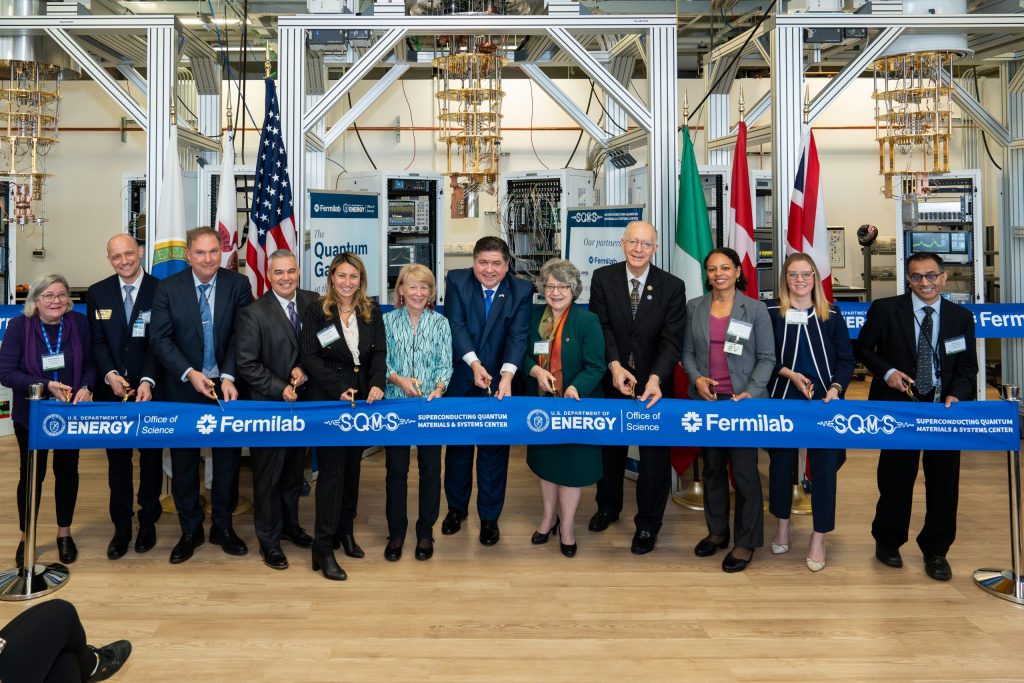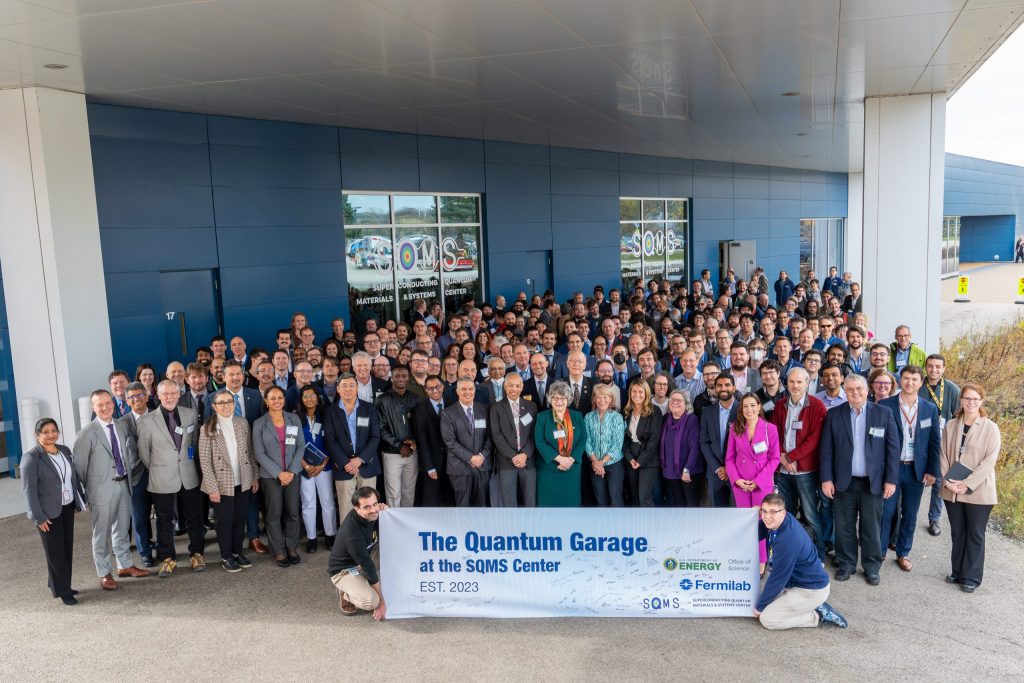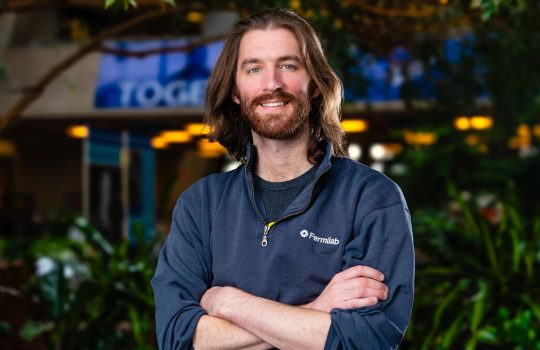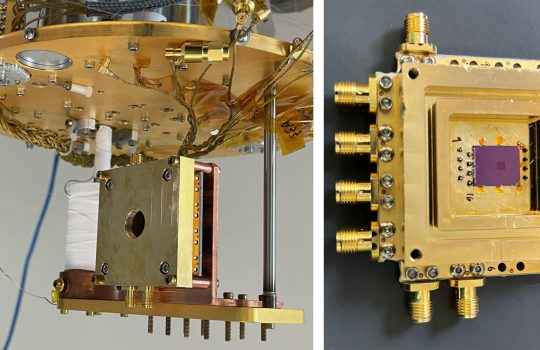The U.S. Department of Energy’s Fermi National Accelerator Laboratory hosted a ribbon-cutting ceremony on Nov. 6 to open “The Quantum Garage,” a new flagship quantum research facility. The 6,000-sq.-ft. lab was imagined, designed and built by the Superconducting Quantum Materials and Systems Center to unite scientific communities, industries and start-ups nationally and internationally to advance quantum information science and technology.
Senior officials attending the event included DOE Undersecretary for Science and Innovation Geri Richmond, Illinois Gov. J.B. Pritzker and Deputy Gov. Martin Torres, U.S. Rep. Bill Foster, members of the Illinois state legislature, the consul generals of U.K. and Italy, as well as leaders from other federal agencies, including NASA, federal labs, academia and industry from across the U.S. and the world.
“The SQMS Quantum Garage will enable the scientific community, including start-ups, academia and industry to advance quantum technology and science, and break through the difficult technical barriers, with increased access to cutting-edge scientific tools and equipment,” said DOE Under Secretary for Science and Innovation Richmond.

Illinois Gov. J.B. Pritzker joined Fermilab leaders, DOE officials, U.S. Rep. Bill Foster, members of the Illinois state legislature, the consul generals of U.K. and Italy, and leaders from other federal agencies, including NASA, federal labs, academia and industry for the ribbon-cutting of the SQMS “Quantum Garage” on Nov. 6. Photo: Dan Svoboda, Fermilab
The facility features several newly commissioned, large dilution refrigerators capable of reaching cryogenic temperatures just a tick above absolute zero. The fridges host platforms developed by the SQMS collaboration for performing quantum computation, sensing, metrology and communications.
These quantum platforms include the first commercial quantum processor deployed on-premise at Fermilab; quantum memories and transducers based on novel approaches that leverage Fermilab’s world-leading technology expertise; quantum metrology tools for developing materials standards; and quantum sensors for fundamental physics, with the potential to discover dark matter and detect gravitational waves.
Each of these platforms and experiments further advance the collaborative efforts of the 34 SQMS partners across industry, academia and federal labs, including Ames National Laboratory, NASA, NIST, Northwestern University, Rigetti Computing, the Italian Institute of Nuclear Physics, the U.K. National Physics Laboratory and more.
“The SQMS Quantum Garage signals a new era in this field, and represents the best of our National Quantum Initiative,” said Gov. Pritzker. “SQMS will accomplish what few other can — building on Fermilab’s unique strengths in related accelerator technology and particle physics, and creating a global partnership which spans across academia, national labs and industry, and federal agencies to reach a new quantum frontier. I’m thrilled to see our state attract the best in quantum science, and I am committed to making Illinois the premier hub of quantum development.”

The SQMS “Quantum Garage” is among one of the largest quantum research facilities at 6,000 square feet that features several extra-large dilution refrigerators. These will be used to host platforms developed by SQMS scientists for quantum computing, sensing, metrology and communications. Photo: Dan Svoboda, Fermilab
The new facility will also train the next generation of quantum computing scientists, engineers and support staff. Recently, this 360-degree research space was the core training ground for the SQMS Center-led U.S. Quantum Information Science School that launched this August. The SQMS Center has already trained hundreds of students and through new partnerships with minority-serving institutions and strategic partners in the state of Illinois, the new lab will be a crucial space for training a diverse quantum workforce.
“At today’s inauguration of the Quantum Garage, we celebrate important scientific and technological advancements made by SQMS during its first three years of existence and, at the same time, the innovations and breakthroughs to come in the field of quantum information science and technology,” said SQMS Center Director Anna Grassellino. “Today would not be possible without the Department of Energy, Fermilab and the hard work done by our staff within the SQMS Center who have built this collaborative space.”
SQMS is one of the five Department of Energy National Quantum Information Science Research Centers.
A recording from today’s event is available at https://cms.illinois.gov/agency/media/video/videos.html.
The Superconducting Quantum Materials and Systems Center at Fermilab is supported by the DOE Office of Science.
The Superconducting Quantum Materials and Systems Center is one of the five U.S. Department of Energy National Quantum Information Science Research Centers. Led by Fermi National Accelerator Laboratory, SQMS is a collaboration of more than 30 partner institutions — national labs, academia and industry — working together to bring transformational advances in the field of quantum information science. The center leverages Fermilab’s expertise in building complex particle accelerators to engineer multiqubit quantum processor platforms based on state-of-the-art qubits and superconducting technologies. Working hand in hand with embedded industry partners, SQMS will build a quantum computer and new quantum sensors at Fermilab, which will open unprecedented computational opportunities. For more information, please visit sqmscenter.fnal.gov.
Fermi National Accelerator Laboratory is America’s premier national laboratory for particle physics research. A U.S. Department of Energy Office of Science laboratory, Fermilab is located near Chicago, Illinois, and operated under contract by the Fermi Research Alliance LLC. Visit Fermilab’s website at https://www.fnal.gov and follow us on Twitter @Fermilab.



